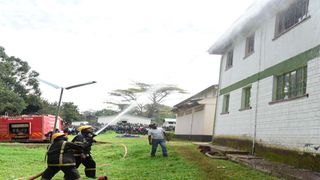
Firemen putting out fire on a burning dormitory at Kakamega High School on November 6, 2021.
| File | Nation Media GroupEducation
Premium
School unrest: Spare the rod, spoil the child?
The recent wave of school unrest has reignited debate on whether caning, banned two decades ago, should be reintroduced, with critics warning that corporal punishment was abolished because it was considered child abuse.
To lift the ban would require amending the law, because the Children Act expressly provides that “no child offender shall be subjected to corporal punishment”.
Under the law, penalties for child offenders include committal to a borstal institution, performing community service, compensating victims, paying fines and being placed under the care of a qualified counsellor.
High school strikes and arson cases have surged since schools reopened, with some parents and teachers asking whether corporal punishment should be reintroduced in schools.
Proponents of caning cite indiscipline among students partly encouraged by the ban on corporal punishment.
While many argue that how children are raised could be a main contributing factor, others aver that learners are under a lot of pressure, trying to adjust to the new academic calendar, with high expectations from both their parents and teachers to attain good grades, amid a fast-paced new era set in motion by the Covid-19 pandemic.
When Education Cabinet Secretary George Magoha toured schools in Machakos County recently, he hinted that corporal punishment could be reintroduced, blaming unrest in schools on indiscipline. “Let us not pretend that we are burning the buildings because of stress from corona. The statistics show otherwise,” he said.
Mr Nicholas Maiyo, the chairperson of the National Parents Association, says that corporal punishment was initially banned to protect the rights of children, which fall under human rights, and reintroducing it will only further complicate matters.
“When we say we introduce corporal punishment, we have to go back to Parliament and discuss the matter. It’s a long, tedious process of changing the law, which would inevitably lead to a referendum, for it to come back,” Mr Maiyo said.
Corporal punishment was abolished in 2001 when the Children Act was enacted. It is prohibited in all settings, including homes. However, the right to ‘administer reasonable punishment’, while rendered void under the constitutional prohibition, is still to be formally repealed.
Corporal punishment is believed to set clear boundaries and motivate students to behave well in school. It is also believed that children are better able to make decisions about their behaviour, exercise self-control, and be accountable for their actions when they understand the penalty they face.
With the adoption of Western culture, many teachers believe that children have become unrulier, because they have some sort of immunity and have developed the mentality that with the law behind their back, they can do just about anything and behave in any way.
Since schools reopened after being shut for almost a year as part of Covid-19 containment measures, students have found it difficult to adapt to new conditions, including shifts in the academic calendar, the suspension of extracurricular activities and the curtailing of entertainment.
Though students understand that the academic calendar needed to be adjusted to allow them to make up for lost time, many believe the Ministry of Education did not consider the psychosocial impact of such drastic changes on children and that officials did not have a plan in place to help them cope.
Indimuli Kahi, chairman of the Kenya Secondary Schools Heads Association, argues that the primary responsibility of disciplining children lies with parents.
“Discipline in our children must begin from home. Parents are the first to ensure that their children’s discipline is beyond reproach,” said Mr Kahi, the principal of Machakos School.
“By the time they come to school, we can only reinforce but we can’t be the initiators. Responsibility for our children is collective. We as administrators, teachers and parents have a role to play.”
The only way ahead, he said, is to allow students an opportunity to ventilate and participate in inter-school activities and for principals to adjust school routines if necessary.





